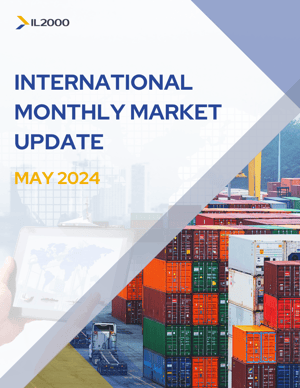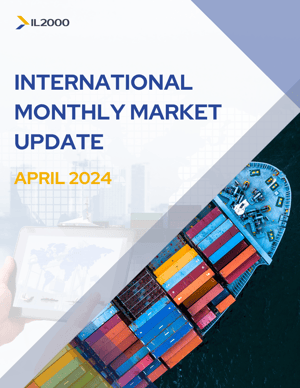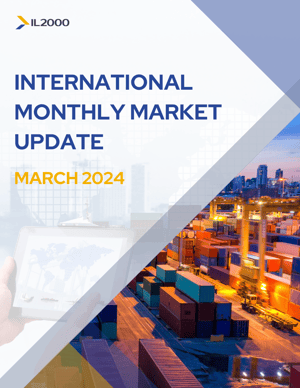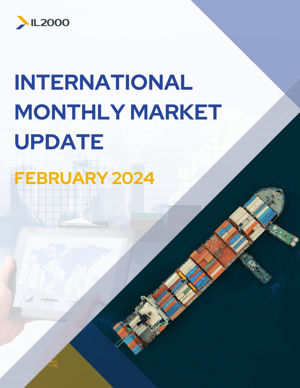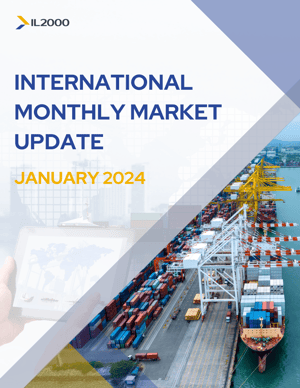International Monthly Market Update
The latest on requirements, carrier announcements, port operations, and customs updates from around the world.
Published 10/3/2024
INTERNATIONAL MONTHLY MARKET UPDATE
October 2024
 The International Longshoremen Association (ILA) initiated a work stoppage at midnight on October 1, impacting 36 marine terminals along the East Coast and into the Gulf. This strike, classified as a force majeure event, is causing significant disruptions at the affected ports and terminals. Customers should brace for delays and service interruptions, including booking suspensions or cancellations, cargo delays, equipment shortages, and other complications. The last strike of this magnitude happened in 1977, which lasted six weeks. The stoppage followed unsuccessful last-minute negotiations between the two parties. ILA President Harold Daggett announced that the union is demanding a $5.00 per hour wage increase for each of the six years in the new master contract. Additionally, the ILA insists on contract language prohibiting any automation or semi-automation at the ports. Daggett emphasized the union's readiness to continue the strike for as long as needed to secure what its members deserve.
The International Longshoremen Association (ILA) initiated a work stoppage at midnight on October 1, impacting 36 marine terminals along the East Coast and into the Gulf. This strike, classified as a force majeure event, is causing significant disruptions at the affected ports and terminals. Customers should brace for delays and service interruptions, including booking suspensions or cancellations, cargo delays, equipment shortages, and other complications. The last strike of this magnitude happened in 1977, which lasted six weeks. The stoppage followed unsuccessful last-minute negotiations between the two parties. ILA President Harold Daggett announced that the union is demanding a $5.00 per hour wage increase for each of the six years in the new master contract. Additionally, the ILA insists on contract language prohibiting any automation or semi-automation at the ports. Daggett emphasized the union's readiness to continue the strike for as long as needed to secure what its members deserve.
As a result of the strike, ocean carriers have increased ocean freight rates and introduced Emergency Congestion Surcharges based on vessel arrival dates, along with force majeure clauses for specific ships. This disruption is also expected to drive a surge in air freight demand, leading to constrained capacity and higher rates.
Carriers Crowley and Trail Bridge have informed their customers that they are not signatories to the ILA Master Contract. Their terminals in Jacksonville, Port Everglades, Philadelphia, and San Juan are not affiliated with the ILA. While they anticipate some disruptions due to the strike, they expect cargo booked with them to move normally through these ports.
If you have any questions or need immediate assistance with planning around this disruption, please reach out to IL2000’s International team.
Storm Helene Recovery Update

CSX continues its efforts to clear debris and address power outages. While their dedicated teams have been working around the clock, there are still areas that are being affected. As of October 2, here is the latest update:
- Florida, Midwest, and Southern Zones are fully operational
- Georgia Zone is operational but expect delays
- Carolina Zone, due to the catastrophic damage, will take longer.
- Augusta, Monroe, and Columbia Subdivisions are expected to be back online this week.
- Blue Ridge Subdivision remains severely affected by infrastructure damage and severe flooding, with two bridges washed out. This will result in a long-term outage with no return date of operations until further notice.
China Update
We’re currently in the middle of Golden Week (Oct 1 – 7), and many factories, ports, and businesses in China and Japan are closed, leading to significant delays in international shipping. Shippers may experience longer transit times, bottlenecks at ports, and slower customs processing. The ripple effects are expected to last through October as supply chains gradually return to normal. Companies should prepare for potential backlogs and consider alternative shipping routes or timelines to mitigate these disruptions.
Air Freight
 The Transportation Security Administration (TSA) announced new regulations effective August 21, 2024. These new changes will bolster air cargo security, with a focus on the Air Cargo Advance Screening (ACSA) program and will expand the Certified Cargo Screening Program (CCSP). Carriers will now be required to provide additional information about shippers and consignees to US Customs and Border Protection. The goal is to give authorities more time to identify any potential threats before cargo arrives in the US.
The Transportation Security Administration (TSA) announced new regulations effective August 21, 2024. These new changes will bolster air cargo security, with a focus on the Air Cargo Advance Screening (ACSA) program and will expand the Certified Cargo Screening Program (CCSP). Carriers will now be required to provide additional information about shippers and consignees to US Customs and Border Protection. The goal is to give authorities more time to identify any potential threats before cargo arrives in the US.
Please visit the Implementation Guide for Air Cargo Advanced Screening (ACAS) for more information.
This program was initially launched in December 2010 after an incident in which concealed explosive devices were discovered on board an aircraft destined for the US. At the time, CBP and TSA partnered to determine a way to review details prior to departure. As a result, regulations implementing the ACSA Program (19 CFS 122.48b) required advanced data to be transmitted before the aircraft departed.
A preliminary deal has been made between Air Canada and the union representing more than 5,200 pilots. The announcement in mid-September outlined a tentative agreement on a four-year contract covering compensation, retirement, and work rules. This action successfully averted a potential strike.
Carrier News
Maersk and Hapag-Lloyd announced a new long-term collaboration called the Gemini Alliance. The agreement, filed with the Federal Maritime Commission in May and set to take effect in February 2025, allows vessels to be shared across seven trade lanes connecting the United States, Asia, Europe, and the Middle East, offering up to 59 services. The Gemini Alliance will focus on three core areas:
- Reliability: Industry-leading schedule reliability of >90%.
- Connectivity: Excellent network coverage with connects and competitive transit times.
- Sustainability: Accelerate decarbonization efforts.
The Alliance will have over 300 vessels, 85 unique ports, up to 3.7 M TEU capacity, and over 6000 port-to-port combinations.
Customs
The changes to Section 321 are making headlines, particularly with the upcoming elections, as both political parties have expressed dissatisfaction with the current $800 de minimis loophole, which many companies—especially those importing from China—are exploiting. Major beneficiaries of Section 321, such as Shein and Temu, are seen as undermining US industries and contributing to environmental issues, concerns prioritized by Republicans and Democrats, respectively.
Even before the elections, the Biden-Harris administration advocates for stricter regulations and permanent legislation, particularly regarding tariffs under Section 201 and 301, to ensure that de minimis exemptions under Section 321 are either limited or subject to additional tariffs. Although US Customs and Border Protection has already implemented new rules for Section 321 entries, the government is pushing for further regulation.
A new bill called the "Fighting Illicit Goods, Helping Trustworthy Importers, and Netting Gains for America Act" has been proposed. If passed, it would close the current de minimis loophole for textile and apparel imports, impose stricter penalties for violations, enhance data collection to better identify and penalize offenders, and introduce a $2 per package fee for more thorough inspection of goods under Section 321. This bill is seen as the best long-term solution for reform.
Regardless of the election outcome, changes to Section 321 are expected, and the loophole for importers will likely be significantly reduced.
US CBP released the August Monthly operational statistics, which include:
 More than 2.9 million customs entries were processed, valued at more than $289 billion, with an estimated duties of nearly $7.5 billion to be collected.
More than 2.9 million customs entries were processed, valued at more than $289 billion, with an estimated duties of nearly $7.5 billion to be collected.- Ocean accounted for 41.8% of all international entries.
- CBP completed 53 audits in August and identified $48.7 million in duties and fees owed from improperly declared goods.
- CBP seized 1,997 shipments that contained counterfeit goods valued at more than $993 million.
- 400 shipments valued at more than $53 million were stopped for further examination due to suspicion of being made with forced labor. CBP is the leader in the US government to eliminate goods made with forced labor.
- August nationwide seizures of cocaine, meth, heroin, fentanyl, and marijuana increased by 31% from July. CBP has seized over 19,600 pounds of fentanyl this year through the end of August.
- CBP is working with DHS and the Department of Treasury to ensure that the de minimis regulatory package enters interagency review.
- CBP is continuing to modernize to help officers quickly and accurately determine which of the nearly 4 million daily de minimis packages need to be examined.
US Customs and Border Protection (CBP) is collaborating with the US Department of Agriculture (USDA), the Animal and Plant Health Inspection Service (APHIS), and the International Air Transport Association (IATA) to develop policies and procedures in partnership with airlines and port authorities at US international airports. This initiative aims to support a new CBP recycling program, allowing airlines to recycle single-use aluminum, paper, and plastic items from international flights arriving in the United States.
The United States Trade Representative announced the final tariff modification of the Section 301 tariffs. The final modification calls for tariff increases on several products, including critical minerals, batteries and semiconductors.
The international team is here to help with your logistic needs! Making Logistics Happen! international@il2000.com
Sources: FreightWaves, Shipspry, The LoadStar, Maersk, Hapag-Lloyd, FMC, CSX, JAS, Crowley, HMM, CBP, Customs and International Trade Law
Past International Market Reports
International Market Update, September 2024
International Market Update, August 2024
International Market Update, July 2024
International Market Update, July 2024
International Market Update, June 2024
International Market Update, May 2024
International Market Update, April 2024
International Market Update, March 2024
International Market Update, February 2024
International Market Update, January 2024
Published 9/1/2024
INTERNATIONAL MONTHLY MARKET UPDATE
September 2024
Seasonal measures for the Brown Marmorated Stink Bug (BMSB) are now in effect. From September 1, 2024, through April 30, 2025, all cargo destined for Australia and New Zealand must undergo fumigation. Shippers must submit a signed BMSB declaration before the documentation cut-off with carriers. Failure to comply will lead to shipment delays. For detailed information on the requirements and the reasons for mandatory fumigation, please refer to the attached link from the Australian Government's Department of Agriculture, Water, and Environment.
As September approaches, concerns about a potential strike by the International Longshoremen's Association (ILA) are intensifying. The ILA has scheduled meetings on September 4th and 5th to address their current demands, but negotiations have stalled since June. The union's demands primarily center around pay increases that surpass the current contract of the International Longshore and Warehouse Union on the West Coast. Additionally, the ILA strongly opposes any incremental automation that would streamline the union’s workforce.
What happens if a new contract isn't reached? The ILA may follow through on their threat to strike on October 1. Under the Taft-Hartley Act, President Biden could request a court order to impose an 80-day cooling-off period. This act allows the government to compel unions back to work if a work stoppage poses a national emergency.
China Update
 (Photo: Explosion on YM Mobility / Source: ShipsGo blog)
(Photo: Explosion on YM Mobility / Source: ShipsGo blog)
On August 9, a massive explosion occurred on the vessel YM Mobility while docked at the Ningbo terminal. Local footage initially showed a significant amount of smoke emanating from the ship, followed by a powerful blast that ignited a fire. The explosion was traced to a hazardous container holding 5.2 type peroxide in a reefer container, which had been substituted for a dry container and was not connected to a power source. This vessel services routes between the Far East and the Middle East Gulf regions. The terminal was shut down for several days, and Yang Ming has declared General Average, meaning all stakeholders will be required to share the costs of the incident.
Port News
Effective September 1, 2024, Pier Pass rates will increase. The Traffic Mitigation Fee (TMF) will increase to $37.71 per TEU and $75.42 Per FEU.
The Port Authority of New York and New Jersey reported its busiest July on record, surpassing 800,000 TEUs. This surge in volume was driven by early peak season shipments and concerns over a potential strike at East and Gulf Coast ports by the International Longshoremen’s Association. The port hasn't experienced such high volume since September 2022, with current figures tracking 14% higher than in June 2024.
High import volumes at Pacific Southwest ports continue to cause delays, with over 5% of current shipments sitting for more than nine days. Many importers have redirected their shipments to the West Coast to avoid a potential strike, contributing to the ongoing congestion. Delays should be expected.
Weather Delays
Weather continues to disrupt shipments off the East Coast of South Africa, with the South African Maritime Safety Authority (SAMSA) reporting another incident. The CMA CGM vessel Belem encountered severe weather, resulting in a stow collapse and the loss of 99 containers overboard. Warnings have been issued for other vessels to report any sightings of the lost containers still floating at sea. This marks the second such incident for CMA CGM within the last month, as the CMA CGM Benjamin Franklin lost 40 containers in the same area just a month earlier. SAMSA is collaborating with the Maritime Rescue Coordination Centre (MRCC) to assist in recovering the lost containers.
Customs
US CBP released the July Monthly operational statistics, which include::
 More than 2.9 million customs entries were processed, valued at more than $297.3 billion, with estimated duties of nearly $7.8 billion to be collected.
More than 2.9 million customs entries were processed, valued at more than $297.3 billion, with estimated duties of nearly $7.8 billion to be collected.- Ocean accounted for 42.57% of all international entries.
- CBP completed 34 audits in July and identified $355.6 million in duties and fees owed from improperly declared goods.
- CBP seized 2,230 shipments containing counterfeit goods valued at over $1.2 billion.
- 408 shipments valued at more than $70 million were stopped for further examination due to suspicion of being made with forced labor. The CBP is the leading US government agency focusing on eliminating goods made with forced labor.
CBP announced the expansion of Operation Plaza Spike, which is the counter-fentanyl surge operation from El Paso and Juarez region, with the addition of Operation Apollo X, which will bring the full force of CBP across the southwest border from El Paso to San Diego.
- CBP officers at the Port of Lukeville seized approximately 4 million blue fentanyl pills weighing more than 1,000 pounds, the largest singular fentanyl seizure in CBP history.
CBP announced the agency's 2024-2025 plan to accelerate testing and adoption of global interoperability standards. The agency will work with both private and public sector partners during the 2024 testing and 2025 international testing phases.
- Interoperability is the ability of different computer systems and software to communicate with each other, allowing CBP and other government agencies to communicate with other software, allowing companies to choose their technology and not have to file directly on CBP ACE system.
United States Trade Representative delays the start of Section 301 tariff modifications while they continue to review comments. The final determination is expected in August 2024.
A national survey from the Cato Institute reveals that 63% of Americans want to increase trade with other nations, while 75% worry tariffs are raising prices.
Effective August 14, CBP at all US ports of entry will no longer withhold the release of tuna and seafood products harvested by Yu Long No.2, a Taiwanese fishing vessel.
The international team is here to help with your logistic needs! Making Logistics Happen! international@il2000.com
Sources: Department of Agriculture, Australian Government, Pier Pass, G Captain, Splash, DSV, WorldCargo News, ShipsGo, CBP.GOV, customsandinternationaltradelaw.com, FreightWaves, Maersk, Sonar
Published 8/2/2024
INTERNATIONAL MONTHLY MARKET UPDATE
August 2024
The International Longshoremen's Association (ILA) remains far from reaching an agreement with maritime employees at the East and Gulf Coast Ports. Negotiations came to a halt in June following allegations that Maersk's terminal at the Port of Mobile violated the current contract by implementing technology projects. ILA President Harold Daggett has criticized the United States Maritime Alliance (USMX) for the slow pace of negotiations. With the contract set to expire on September 30, Daggett has stressed that the union's 85,000 members will not work beyond this date without a new deal. The previous contract negotiations in 2018 concluded with an agreement in early September. Shippers have already begun to divert some cargo to the West Coast.
FMC Update
The Federal Maritime Commission denies allegations that it is attempting to regulate rates in its new ruling, which prohibits ocean carriers from refusing to provide capacity to their customers. The final rule, set to take effect on September 23, 2024, under the Ocean Shipping Reform Act of 2022, addresses instances where carriers refuse to negotiate or deal with customers regarding container space. In response to complaints, the agency clarified that it is "simply providing a comparison point between rates a carrier offers in negotiation and the rates the rest of the market is charging for space." The preamble states, "This rule establishes the necessary elements for the FMC to apply federal law with respect to refusal of cargo space accommodations when available."
Port News
On July 18, US Transportation Secretary Pete Buttigieg and other officials broke ground on a $1.5 billion rail yard expansion project at the Port of Long Beach. Dubbed America’s Green Gateway, this project aims to connect the port to 30 major rail hubs across the US and expand the existing rail yard. With 40% of all shipping containers entering the US through the Port of Long Beach or Los Angeles, Long Beach remains one of the busiest seaports in the country. Scheduled for completion by 2032, the project plans to add 36 rail tracks to the existing 12 and increase daily train capacity to 17. Additionally, the project emphasizes community health by aiming to reduce pollution, as one train can carry the equivalent of 750 truckloads of cargo. Without this rail connection, cargo would need to be transported by truck to the rail yards in downtown Los Angeles, thereby increasing truck pollution in the surrounding communities.
After the Panama Canal experienced its third driest year on record in 2023, the rainy season arrived early this year. This has allowed authorities to increase the number of ships authorized to cross. The Canal's deputy administrator announced this past week that the number of daily transit slots will increase to 36 for vessels.
Delays

Stormy weather off the Cape of Good Hope in South Africa
As global transit times continue to be disrupted by diversions away from the Red Sea, severe weather is now impacting conditions off the coast of South Africa. Extreme weather conditions, including high winds and waves exceeding 33 feet, caused a complete stop at the Cape of Good Hope in mid-July. This disruption affected container ships traveling both eastbound and westbound. The high waves were generated by a strong cyclone that passed through the region. It is estimated that over 6,000 container ships could be impacted by these extreme weather conditions.
Customs
 US CBP released the June monthly operational statistics, which include:
US CBP released the June monthly operational statistics, which include:
- More than 2.8 million customs entries were processed, valued at more than $272.1 billion, with estimated duties of nearly $6.7 billion to be collected.
- Ocean accounted for $42.2% of all international entries.
- CBP completed 19 audits in June and identified $9 million in duties and fees owed from improperly declared goods.
- CBP seized 1501 shipments containing counterfeit goods valued at over $395 million.
- 291 entries valued at more than $39 million were stopped for further examination due to suspicion of being made with forced labor. The CBP is the leader in the US government in eliminating goods made with forced labor.
On June 26, during the public meeting of the Commercial Customs Operations Advisory Committee, it was announced the 5 entities who will help the CBP develop and implement the accreditation standards for the Customs Broker Continuing Education program.
United States Trade Representative (USTR) released the second report on the United States-Mexico-Canada Agreement (USMCA) and found that the agreement has had a positive economic impact on the US auto industry in the four years since it went into effect.
Norfolk CBP seized 305 window air conditioners for bearing counterfeit Energy Star certification marks.
On July 1, the Census Bureau announced that effective immediately, the Schedule B, Harmonized Tariff Schedule (HTS), and HTS Codes that are not valid for AES tables have been updated to accept the changes to the July 1 codes.
USTR announced that Section 301 (China) Tariff Modification, scheduled to be implemented on August 1, has been delayed. These modifications included a number of tariff increases on many items, including battery parts, lithium-ion electric vehicle batteries, critical minerals, medical products, solar cells, and ship-to-shore cranes. USTR hopes to announce its status sometime in August with a decision on the final modification.
The international team is here to help with your logistic needs! Making Logistics Happen! international@il2000.com
Sources: FreightWaves, Journal of Commerce, Shipco, Transport Topics, G Captain, Supply Chain Drive, Reuters, cbp.gov; customsandinternationaltradelaw.com; cvinternational.com

Published 7/8/2024
INTERNATIONAL MONTHLY MARKET UPDATE
July 2024
As we enter Peak Season earlier than usual, ocean demand is outstripping the available equipment and vessels. This imbalance is driving rates up, now nearly 3.5 times higher than just a year ago. The Journal of Commerce reported that mid-June average spot rates on trans-Pacific and Asia-Europe routes are reaching levels not seen since the summer of 2022. Carriers continue to raise rates every 15 days, canceling bookings with lower rates and now reducing tonnage for shippers.
It has been nine months since the Houthi attacks began in the Red Sea, rendering the Suez Canal unsafe for carriers and unusable in the near future. DHL told CNBC they expect ocean freight rates to keep rising through the Chinese New Year in 2025. Some forecasts predict these rates will surpass the peak levels seen during the COVID-19 pandemic in 2022. Data from SONAR and Xeneta indicate that shippers of consumer products like furniture, arts and crafts, toys, and low-value cargo are holding back their materials, waiting for the market to stabilize. Meanwhile, other commodities, such as high-tech products and automotive goods, are severely impacted by new tariffs, as they are in high demand.
Advisory for Port of New York / New Jersey
For the past six weeks, operational trucking challenges have severely strained conditions. Increased return containers, issues with the Terminal Appointment System, and unexpected tolls are causing long lines, driver delays, and decreased productivity. Drivers are forced to queue outside the terminal, sometimes extending for several miles. These delays are largely due to the rerouting of vessels from Baltimore, which is expected to continue for several months. Please check with the IL2000 International team for any shipments moving through these ports.
Port News
The Indian Government has announced plans to develop a new port on the west coast, just north of Mumbai, with an estimated investment of $9.1 billion. The Vadhavan Port will be designed to enhance capacity, featuring nine terminals, four multipurpose berths, and an annual capacity to handle 300 million tons of cargo. This port is a key component of India's strategy to become an industrial powerhouse and will play a crucial role in facilitating trade between India, the Middle East, and Europe.

Site plan for the mega port JNPA. Source: The Maritime Executive
The Port of Charleston experienced an incident when the MSC Michigan VII, traveling at twice the normal speed, lost control on June 5 while exiting the terminal due to a malfunction in its propulsion system. The vessel's wake damaged Pier J, and the cargo ship Norway Pearl was violently pushed into another pier. A lawsuit has been filed, seeking over $500,000 to cover the property damages.
The South Carolina Ports Authority announced a two-week pause on the ongoing construction project that has shut down one of the berths at the Wando Welch Terminal. Although the exact dates are yet to be determined, the break will occur shortly after the July 4th holiday. This pause is necessary to help clear a backlog of vessels, which has been an issue since May.
Air Freight
FedEx recently retired twenty-two Boeing 757-200 freighters as part of a downsizing effort to better align with slower parcel demand. By the end of September, FedEx will no longer be the primary provider for the US Postal Service, with UPS taking over with a new five-year contract. Since 2022, FedEx has steadily reduced its fleet, pulling more aircraft out of service.
Volume and rates out of Asia and the subcontinent continue to rise due to all the disruptions caused by the Red Sea. A year-over-year comparison posted by S&P Global shows rates are up over one-third for Shanghai.

Shanghai outbound air cargo index by Baltic Air Freight Indices powered by TAC. Source: Journal of Commerce by S&P
Customs
US Customs seized 450 pounds of cocaine from a merchant vessel originating from the Dominican Republic that arrived in San Juan, Puerto Rico, on June 12. The cocaine, estimated to be worth $4 million, was concealed in a container chassis aboard the roll-on/roll-off vessel Blue Harmony. Field Director of Operations Roberto Vaquero highlighted that this discovery underscores the relentless efforts of their team to intercept and dismantle drug trafficking operations. This drug bust came just days after another incident near St. Croix, where the US Coast Guard seized $7.4 million worth of cocaine from a different vessel.
US CBP released the May monthly operational statistics, which include:
- More than 2.9 million customs entries were processed, valued at more than $284.8 billion, with an estimated duties of nearly $6.7 billion to be collected.
- Ocean accounted for $41.6% of all international entries.
- CBP completed 46 audits in April and identified $20 million in duties and fees owed from improperly declared goods.
- CBP seized 1640 shipments that contained counterfeit goods valued at more than $331 million.
- 450 entries valued at more than $100 million were stopped for further examination due to suspicion of being made with forced labor. CBP is the leader in the US government to eliminate goods made with forced labor.
On June 4, CBP updated the HTS system with the 301 exclusion extensions and changed to PGA flag indicators for the FDA.
President Biden’s Administration announced an extended suspension of the 25% tariff on steel and derivative steel products imported from Ukraine, which will remain in effect until June 1, 2025.
FMC opened a 12-day comment period starting June 6 to allow the industry to respond to the vessel-sharing agreement between Maersk and Hapag Loyd, known as the Gemini Cooperation Agreement. If the FMC takes no action, the agreement will take effect July 15.
The international team is here to help with your logistic needs! Making Logistics Happen! international@il2000.com
Sources: FreightWaves, American Shipper, Journal of Commerce, The Maritime Executive, SONAR, Xeneta, cbp.gov, Shipco
customsandinternationaltradelaw.com

Published 6/5/2024
INTERNATIONAL MONTHLY MARKET UPDATE
June 2024
As vessels continue to avoid the Red Sea, China faces extreme equipment shortages caused by longer transit times to Europe and North America. After the Chinese Lunar New Year, the demand for exports out of China rose 13.2%. China base ports are challenged to keep up with demand. Ningbo, Guangzhou, and Dalian are experiencing the worst shortages, where inland hubs such as Wuhan and Chongqing face similar challenges with 40ft and 40HC containers.
 Carriers limited allocation with heavy blank sailings over the month of May and increased spot rates over fixed-rate bookings. This is expected to continue as many are stating Peak Season has come early this year. Additionally, carriers are back to only guaranteeing secure space allocation with a premium add-on for ocean freight. Be sure to pre-book shipments if possible!
Carriers limited allocation with heavy blank sailings over the month of May and increased spot rates over fixed-rate bookings. This is expected to continue as many are stating Peak Season has come early this year. Additionally, carriers are back to only guaranteeing secure space allocation with a premium add-on for ocean freight. Be sure to pre-book shipments if possible!
Marine risk has also increased at unprecedented speed, with 154 attacks reported by American Shipper since November. These vessels experienced fires, engine failures, marine hull damage, and cyber-attacks. With the use of the alternative route around Cape Horn and the Southern Hemisphere now entering its winter season, extreme weather could “induce” parametric rolling, which could lead to containers falling overboard. [Photo right: Ship's mast heading toward Cape Horn.]
Risk is now at an all-time high as this season is upon us. We recommend shippers check their marine insurance coverage or reach out to IL2000 for a quote.
Europe
The new Import Control System 2 (ICS2) by the European Union began on June 3. This new IT system collects data for all goods entering the EU prior to cargo arriving. The new requirements mandatory on each house bill of lading are:
- Complete and accurate cargo description
- First six digits of the harmonized tariff code
- Additional details of all parties involved in the transaction (seller, buyer, consignee, and consignor)
- EORI number assigned to the destination party
If this information is not provided, consignments can be stopped before the shipment leaves the United States or held by customs upon arrival. The shipment will not be cleared and may be rejected and returned to its origin. This requirement includes all international movement of goods for containerized cargo, airfreight, inland waterways, railroads, and road transport.
Port News
The container ship Dali, which crashed into the Francis Scott Key Bridge in March, was finally moved back to port. The Unified Command, working with local and federal agencies, managed the operation to help the ship become buoyant, allowing tugboats to escort it back at one mph. In May, a preliminary National Transportation Safety Board reported that the vessel lost power twice in the three minutes before the crash.
The situation in the Port of Baltimore remains fluid. Maersk released an update that imports to Baltimore from Asia are currently open for acceptance, subject to space availability. The ability to call the Port of Baltimore will rely on the Captain of the Port to officially open. Vessels may still be redirected to another US East Coast port if the reopening timeline is pushed back.
Last year, data was released that the launch of new builds for vessels was at an all-time high for 2024. In March, 41 new vessels were delivered with a capacity of 260,000 TEUs. Alphaliner recorded 50 new vessels for April with a capacity of 333,000 TEUs. More are expected to be released in June. Stricter environmental regulations and vessel diversions to the Cape of Good Hope due to the Red Sea crisis have created additional tonnage demand. Volume forecasts remain healthy, with tonnage supply remaining fairly tight.
Global ocean carriers Cosco, Mediterranean Shipping and CMA CGM have all launched new services targeting Asia-to-Mexico trade. Container volumes are soaring as Chinese companies' investments in Mexico have spiked. Cosco and its subsidiary OOCL’s new Transpacific Latin Pacific 5 (TLP5) line now offer direct connections between China, Japan, South Korea, and Mexico. MSC launched their new shuttle service on May 15 sailing from Qingdao to Mexico with the MSC Apollo.
New data released from Freight Waves Sonar showed volumes from China to Mexico were up 44% over the past year with a massive uptick of 145% since March.
FreightWaves’ SONAR Inbound Ocean Twenty-foot Equivalent Unit (TEU) Volume Index shows that imports from China to Mexico (IOTI.CHNMEX) have been increasing since May 2023. Source: FreightWaves
Air Freight
Demand for air cargo continues to downturn. However, Maersk is looking ahead to 2024. In April, Maersk Air Cargo opened a 90,000-square-foot facility in Miami. Next quarter, the carrier will have its first two 777s for airline operation. Currently, they are offering nine flights per week from China to the US and are looking to expand into the Latin market.
Customs
US CBP released the April monthly operational statistics, which include:
- More than 3.2 million customs entries were processed, valued at more than $289 billion with an estimated duties of nearly $6.4 billion to be collected.
- Ocean accounted for $39.66% of all international entries.
- CBP completed 20 audits in April and identified $13 million in duties and fees owed from improperly declared goods.
- CBP seized 1736 shipments that contained counterfeit goods valued at more than $235 million.
- 392 entries valued at more than $184 million were stopped for further examination due to suspicion of being made with forced labor. CBP is the leader in the US government to eliminate goods made with forced labor.
CBP launched a new website to update customs brokers on the Continuing Education for Licensed Customs Brokers Final Rule.
The US State Department issued a proposed rule to amend the ITAR, including a license exemption to support defense trade between the US, Australia, and the UK.
The White House announced additional Section 301 increases on Chinese Goods. Impacted industries include steel and aluminum, semiconductors, electric vehicles, batteries, critical minerals, solar cells, ship-to-shore cranes and medical products.
The international team is here to help with your logistic needs! Making Logistics Happen! international@il2000.com
Sources: FreightWaves, Splash, cbp.gov, customsandinternationaltradelaw.com, Shipco, Journal of Commerce, Maersk, Sinpex, American Shipper, MSN News

Published 5/1/2024
INTERNATIONAL MONTHLY MARKET UPDATE
May 2024
On April 5, Maryland Governor Wes Moore signed an executive order providing $60 million to support workers and businesses affected by the Baltimore bridge collapse. Moore is taking steps to help the families who lost loved ones by appointing a liaison to work with the families. In addition, he proposed a permanent scholarship program for the families. Two victims remain unaccounted for.
The US Army Corps of Engineers is working to clear the bridge wreckage and to create one passage for access in and out of the port. Authorities advise that they expect a new 35-foot limited access channel to be open in early May. This would allow smaller ships transporting cars and RORO vessels to move through. Larger container ships must wait as they require deeper clearance, and the current access channel will not support them.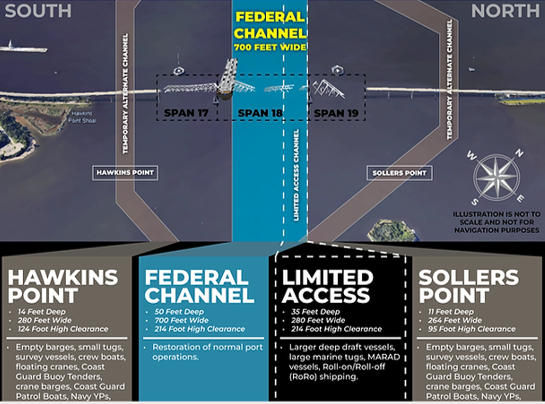
Proposed channel access. Image source: ACL (Atlantic Container Line)
The Baltimore Captain of the Port (COTP) also announced another channel at a depth of 20 feet, which will provide limited access for commercially essential vessels. This could potentially allow ocean carriers to operate limited barge services in and out of the port.
Due to the increased cargo volume from Baltimore being shifted to other ports, carriers anticipate vessels bunching up and wait times increasing to two to four days. The current wait times at these ports are:
- New York: 1 to 2 days
- Norfolk: 3 to 4 days
- Wilmington and Philadelphia: no delays
Train derailment
A 35-car train derailed on April 26 at the Arizona-New Mexico border is under investigation. According to the Arizona Governor, as the train was carrying propane and gasoline, the accident was treated as a hazardous materials incident. Luckily, no injuries were sustained.
Source USA Today: A train derailed near Lupton, Arizona, near the New Mexico border on April 26, 2024. Photo source: Arizona Corporation Commission
China News
BCO demand increased heavily in April.
- Pacific Southwest and US East Coast is very tight, with heavy rollover due to increasing blank sailings for May. Blank sailings are currently between 12 and 20%.
- Average wait time at China Base ports is 1 to 2 days.
- Equipment shortages in Tianjin and Qingdao.
Port News
Alphaliner released the 30 biggest global ports for 2023. Shanghai, Singapore, and Ningbo took the top spots, while Los Angeles and Long Beach were ranked number nine.
The Port of Los Angeles recorded its eighth consecutive month of growth, with a 19% year-over-year increase in container handling. In the first three months of the year, the port handled 2.38 million TEUs, a 30% increase over the 2023 units handled.
Carrier News
Tensions between Iran and Israel continue as The MSC Aries, a Portuguese-flagged vessel, was seized by Iran on April 13. Iran’s foreign ministry stated the ship was violating maritime laws, adding they believed the vessel was linked to Israel. The vessel, carrying over 14,000 TEUs, was taken at the entrance of the Persian Gulf at the Strait of Hormuz. The vessel was moving on the HEX service, which operates between India and North Europe, with weekly rotation to Nhava Sheva and Mundra.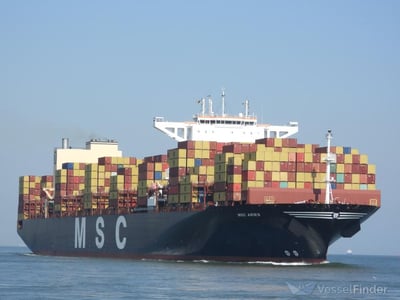
MSC Aries. Photo source: Vessel Finder
Air Freight
Amerijet International announced in late April that it is planning to furlough a number of pilots to help increase cash flow. The Miami-based cargo airline is reducing the pilot roster due to lower customer demand and the loss of the US Postal Service contract. The Air Line Pilots Association (ALPA) is working out final details to help mitigate the short-term staffing issues. Additionally, FedEx Express acknowledged they have 700 more pilots than needed, as overnight package demand has slowed.
Air freight volumes have finally rebounded. However, Amerjet is forced to downsize further, affecting their core service to the Caribbean and Latin America.
Cargo operations were disrupted in Dubai when unexpected freak rainfall hit the UAE on April 16. Two years’ rainfall (26cm) hit in one day, leading to flash floods, flooding and the temporary closure of DXB with the cancellation of around 300 flights. This impacted various cargo airlines, including Emirates SkyCargo, which said they faced "operational challenges, including flight cancellations and delays in cargo." Flights have since resumed, and the schedule has returned to normal.
Intra-country transportation was also affected, with many trucks being unable to transport containers from ports like Jebel Ali to the airport.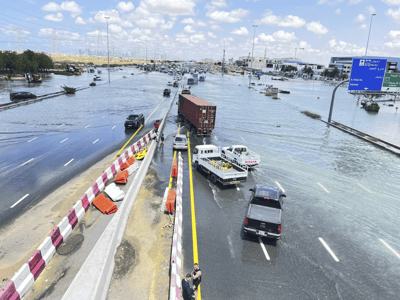
Source CNN: Vehicles, including cargo trucks, were stuck on a flooded road after a rainstorm hit Dubai, United Arab Emirates) Photo: Rula Rouhana/Reuters
Customs
US CBP’s February monthly operational statistics include:
- More than 2.8 million customs entries processed, valued at more than $275 billion, with estimated duties of nearly $6.2 billion to be collected.
- Ocean accounted for 39.67% of all international entries.
- CBP seized 1633 shipments containing counterfeit goods valued at over $384 million.
- 749 entries were stopped for further examination due to suspicion of being made with forced labor. CBP is the leader in the US government to eliminate goods made with forced labor.
CBP warns of increasing impersonation scams involving individuals posing as CBP employees demanding payment or sensitive information. If you get one of these calls, hang up and report the call to the Federal Trade Commission.
CBP issued an Entry Type 86 fact sheet providing guidance on who may make entries and requirements for brokers. They also warn that bad actors exploit Type 86 entries to traffic illicit goods and circumvent legitimate trade. The data on these entries are limited and vague, and CBP is increasing its enforcement efforts to ensure compliance.
North American Importer groups and brokers sent a letter to Canada's Committee on International Trade warning them that the CARM launch set for May 13 is not ready. They cited a low number of fully certified participants and ongoing incorrect calculation of duties and taxes in CARM.
The international team is here to help with your logistic needs! Making Logistics Happen! international@il2000.com
Sources: FreightWaves, ACL Lines, Alphaliner, Shipco, cbp.gov, Maersk, Reuters, Journal of Commerce, Sinpex, USA Today, Vessel
Finder, CNN

Published 4/1/2024
INTERNATIONAL MONTHLY MARKET UPDATE
April 2024
In the early morning of March 26, the Singapore-flagged vessel Dali struck the Francis Scott Key Bridge in Baltimore. Our sympathy goes out to all affected by this traffic incident and their families.
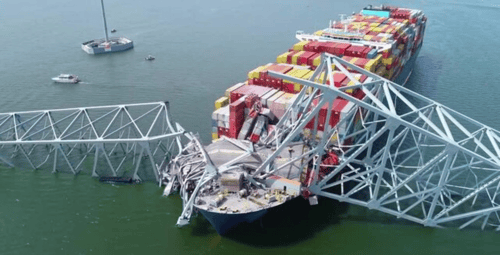 The vessel had operational issues and struck the bridge, instantly causing the structure to collapse. Before any shipping can be resumed at the Baltimore port, crews will need to work diligently to remove debris and clear the channel for ships to resume passage. Ocean carriers are already sending notice that this is a force majeure situation, and any existing voyages to and from Baltimore Port will be terminated. Contingency plans are starting with many carriers using New York and Norfolk ports. Governors of New York and New Jersey offered to take shipments to try and minimize supply chain problems. The vessel, almost as long as the Eiffel Tower, was carrying nearly 4700 shipping containers on board, 56 of which contained hazardous material, and it has been reported that 14 of them were destroyed. Environmentalists reviewed the contents and stated there was no immediate environmental threat. The US Army Corps of Engineers is in the process of moving the largest crane on the Eastern Seaboard to help remove the wreckage of the bridge. The Biden Administration has immediately approved $60 million in federal aid to assist. Maryland Governor Wes Moore warned everyone that this is a long road ahead. Until further notice, the port is closed indefinitely.
The vessel had operational issues and struck the bridge, instantly causing the structure to collapse. Before any shipping can be resumed at the Baltimore port, crews will need to work diligently to remove debris and clear the channel for ships to resume passage. Ocean carriers are already sending notice that this is a force majeure situation, and any existing voyages to and from Baltimore Port will be terminated. Contingency plans are starting with many carriers using New York and Norfolk ports. Governors of New York and New Jersey offered to take shipments to try and minimize supply chain problems. The vessel, almost as long as the Eiffel Tower, was carrying nearly 4700 shipping containers on board, 56 of which contained hazardous material, and it has been reported that 14 of them were destroyed. Environmentalists reviewed the contents and stated there was no immediate environmental threat. The US Army Corps of Engineers is in the process of moving the largest crane on the Eastern Seaboard to help remove the wreckage of the bridge. The Biden Administration has immediately approved $60 million in federal aid to assist. Maryland Governor Wes Moore warned everyone that this is a long road ahead. Until further notice, the port is closed indefinitely.
The Port of Baltimore is one of the largest ports for Ro-Ro vessels that carry automobiles and light trucks. The loss of the bridge, along with the port disruptions, affects over 30,000 vehicles a day. The president of the International Longshoremen's Association, Scott Cowan, said the union is scrambling, as roughly 2400 members are at risk of their jobs drying up until the port can be reopened.
Current estimates state that more than 40 ships, including smaller cargo ships, tugboats, and pleasure crafts, remain inside the Baltimore Port. Marine Traffic showed that another 30 ships destined for Baltimore Port will be rerouted.
IL2000’s international team will continue to support our customers with alternative solutions should they be impacted.
Port News
Maersk has already notified customers with import cargo destined for New York, Newark, and Norfolk to arrange for the pick-up of containers as quickly as possible to help with the overflow.
Things are starting to turn a corner for vessels moving through the Panama Canal. Mid-month, the canal began to increase the number of slots per day. As of March 25, slot capacity increased to 27. A spokesperson for the canal stated that efficient water-saving measures have allowed them to increase the daily number of transits while still maintaining the 44-foot draft for the rest of the dry season. While the canal is still not at full slot capacity, which averaged 36 daily pre-drought, the outlook is moving in the right direction. The level of Gatun Lake rose a foot in March.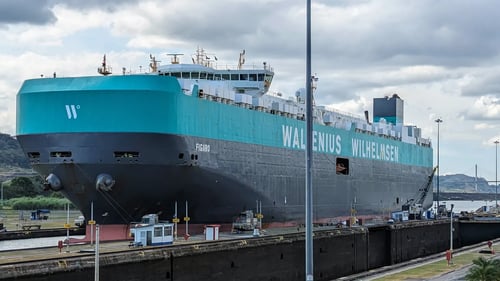
A ship enters the Miraflores Locks on February 3, 2024. Due to higher water levels in Gatun Lake, the Panama Canal will increase daily booking slots to 27 starting March 25. Source: Supply Chain Dive
Imports
The US Commerce Department reported that Mexico overtook China as America’s top trade partner for 2023. This is based on the China/Mexico trade lane. Annual growth increased 34.8% in 2023 compared to 3.5% in 2022. This January showed an increase of 60% for container shipping compared to 12 months ago. Chief Analyst from Xeneta, Peter Sand, commented that the data proves businesses in the US are trying to avoid the tariffs placed on goods imported from China to the US. In recent years, Chinese companies expanding into Mexico have seen significant growth.
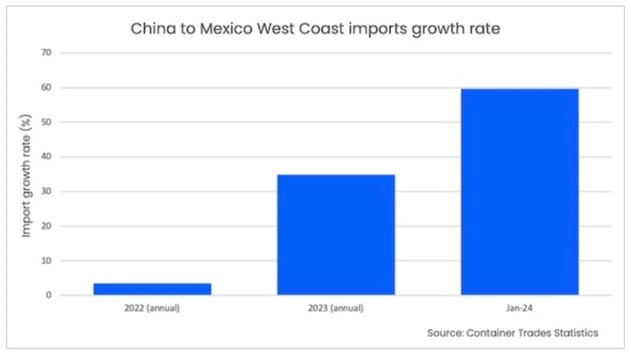 Source: Splash247
Source: Splash247
Customs
The US CBP released the February monthly operational statistics, which include:
- More than 2.6 million customs entries processed valued at more than $255 billion with estimated duties of nearly $6.5 billion to be collected.
- Ocean accounted for 40.8% of all international trade.
- CBP intensifying its targeting and enforcement efforts to combat textile and trade imports that are not compliant with US law, focusing on de minimis compliance, forced labor enforcement, cargo compliance, regulatory audits and public awareness.
The US CBP has announced that it is partnering with the FDA to expand the focus of the Global Business Identifier (GBI) Test. This will expand the test further and see if it can be used for other supply chain traceability needs. The CBP is also using this to determine if it can address data gaps caused by CBP Manufacturing Identifier requirements.
President Biden signed the Customs Business Fairness Act into law on March 9. This will allow for the full subrogation of claims for the payment of customs duties, protecting customs brokers who are outlying duties on behalf of imports who then file for bankruptcy.
The US CBP issued cybersecurity incident procedures guidelines for brokers, which explain the process and roles and responsibilities of the CBP and the brokerage community regarding how to facilitate the importation, entry, and entry summary process in the event a cybersecurity incident happens to a broker.
The international team is here to help with your logistic needs! Making Logistics Happen! international@il2000.com
Sources: Supply Chain Dive, Splash247, ACL Lines, strtrade.com, cbp.gov, customsandinternationaltradelaw.com, Associated Press, Yahoo, Reuters, Maersk

Published 3/5/2024
INTERNATIONAL MONTHLY MARKET UPDATE
March 2024
IL2000 continues to closely monitor the situation around the Red Sea and the Gulf of Aden. We are close to 80 days without any sustainable resolution. Due to continuing delays, we encourage all customers to plan ahead. Prepare for space availability disruptions, transit time delays, and costs. Many ocean carriers have planned GRIs for later in the month.
The TPM24 conference is taking place March 3 to 6. The theme this year is Extreme Normalization Fallout. The ultimate goal of the conference is to illuminate where the market is heading for the remainder of the year and beyond. We look forward to gathering more insights over the coming month to share with you.
Imports
Mid-month data indicates that January saw the sharpest import increase in the past seven years. Despite tensions involving the Suez Canal and the continued drought at the Panama Canal, data from Descartes showed a 7.9% growth. January is usually a slower month as China prepares to go on holiday, and February is when the spike happens. In addition to the rise in volume we’ve been seeing on the West Coast, Norfolk and Baltimore showed a volume rise from 3.4% to 5.1%.
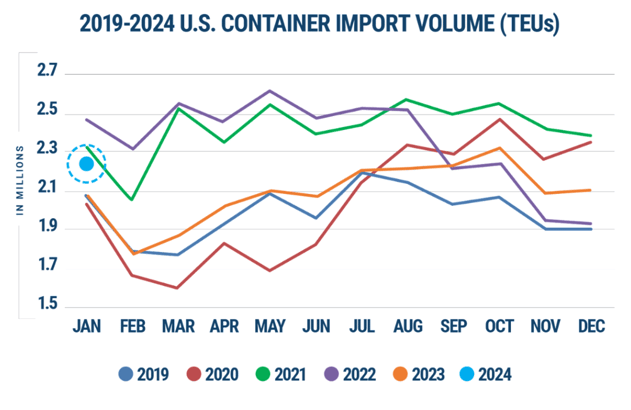 Source: Descartes Datamyne/ FreightWaves
Source: Descartes Datamyne/ FreightWaves
FMC News
February 13, FMC voted four to one to uphold a chassis pool system administrative law judge (ALJ) ruling that went into effect one year ago. The Intermodal Motor Carriers Conference (IMCC) initially started the case against the Ocean Carrier Equipment Management Association (OCEMA). This is a US-based group of 12 major ocean carriers. The law says, “a common carrier, marine terminal operator, or ocean transportation intermediary may not fail to establish, observe, and enforce just and reasonable regulations and practices relating to or connected with receiving, handling, storage or delivering property." OCEMA’s practices deny merchant haulers the opportunity to negotiate rates and terms of service. (Source: FreightWaves)
Labor Talks
At the end of September, the contract between the International Longshoremen’s Association (ILA) and the United States Maritime Alliance (USMX) is set to expire. The USMX represents 36 coastal ports, including three of the US’s busiest ports: Port of New York and New Jersey, Port of Savannah and Port of Houston. Contract negotiations between the two started back in February 2023, then halted due to issues surrounding wage increases. ILA’s President Harold Daggett cautions there is no chance of extending the contract. As talk of potential disruptions increases, the ILA warns they are prepared for the possibility of a strike in October.
Air Freight
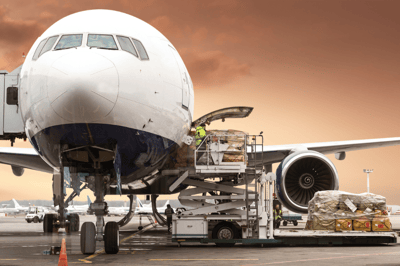 WorldACD released data showing air cargo demand was significantly up compared to last year. The 5% growth can be attributed to various factors, including the Chinese New Year and the ongoing disruptions in the Red Sea. The redirection around the Cape of Good Hope for ocean carriers has increased transit times by up to four weeks in some instances. Airlines have been adding back additional service, resulting in a 12% rise in capacity. While rates have dropped 22% from last year, they remain 32% higher than pre-covid.
WorldACD released data showing air cargo demand was significantly up compared to last year. The 5% growth can be attributed to various factors, including the Chinese New Year and the ongoing disruptions in the Red Sea. The redirection around the Cape of Good Hope for ocean carriers has increased transit times by up to four weeks in some instances. Airlines have been adding back additional service, resulting in a 12% rise in capacity. While rates have dropped 22% from last year, they remain 32% higher than pre-covid.
Customs
CBP’s latest updates released for January 2024 include the following:
- CBP processed over 2.7 million entry summaries valued at more than $267 billion, with estimated duties being nearly $7 billion. Of this, 44% was via ocean entries.
- Eradicating forced labor from our supply chains continues to be a priority of the US government, with CBP leading the efforts. CBP stopped 424 shipments valuing $236 million suspected of use of forced labor.
The US is the world leader in taking action against forced labor. The US CBP is transparent that they will continue to prioritize enforcement of preventing products from forced labor from entering into US commerce. The USCBP is the only US government agency and one of the few agencies in the world with legal authority to take this kind of action.
The Office of Foreign Assets Control sanctioned a procurement network for facilitating the illegal export of goods and technology from over two dozen US companies to end-users in Iran.
The United States Trade Representative and the Interagency Committee for Trade in Automotive Goods conducted a hearing to examine feedback concerning the implementation of the USMCA, explicitly focusing on automotive trade.
The international team is here to help with your logistic needs! Making Logistics Happen! international@il2000.com
Sources: FreightWaves, AirCargo News, WorldACD, TPM24, Maersk, Customs & International Trade Law, and cbp.gov

Published 2/5/2024
INTERNATIONAL MONTHLY MARKET UPDATE
February 2024
Over the last few weeks, mass diversions of container ships are now rerouting around Africa’s Cape of Good Hope. Carriers sent a notice that transits through the Red Sea should stop altogether due to the heightened security risk. Safety for the crews is their number one priority. As carriers adjust their schedules to longer routes, the Chinese New Year’s decreased demand will help keep vessels moving. Below is a snapshot released by Marine Traffic at the end of January showing current container ships routing around Africa.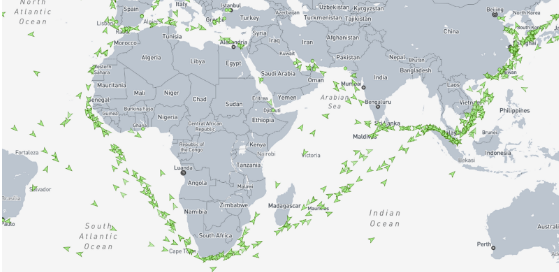
Source: FreightWaves
With the continued attacks in the Red Sea, rates over the last month have almost doubled. According to the Drewry, the average cost of a 40ft container rose 23%. The increases are not limited to the disrupted trade routes between China and Europe. Spot market rates from China to Los Angeles rose 38% in just one week in January.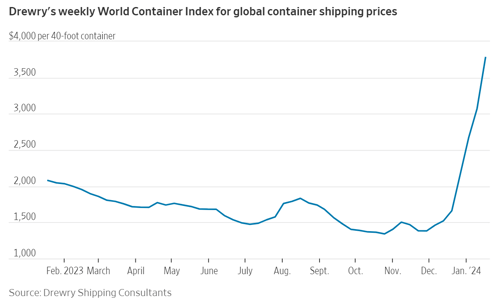
Source: Wall Street Journal
The Federal Maritime Commission (FMC) will hold an informal hearing on February 7, 2024. They will examine how conditions in the Red Sea and Gulf of Adens regions impact commercial shipping and global supply chains.
FMC also announced that Transpacific Eastbound Carriers have recently updated their respective tariffs to implement general rate increases (GRIs) effective February 15 and March 1. The carrier list includes CMA CGM, COSCO, Evergreen, Hapag, HMM, ONE, Yang Ming, and ZIM. The rate increase averages $1000 to $2000 per date for each carrier.
Panama Canal
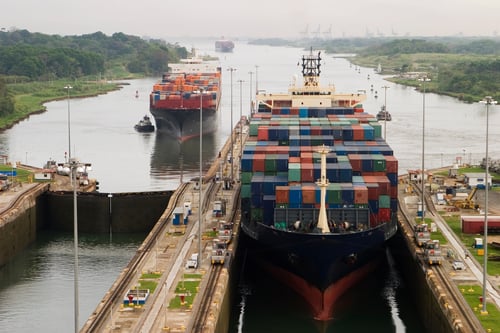
News posted on the Panama Canal continues to decline. Transits dropped another 4.7% in December, with an overall 21.9% decline since October. Panama has entered its dry season, which has been extended to May this year. Reservations were further restricted by the Panama Canal Authority (ACP). Data shows the locks averaged 17.42 transits daily, down 37% from last year.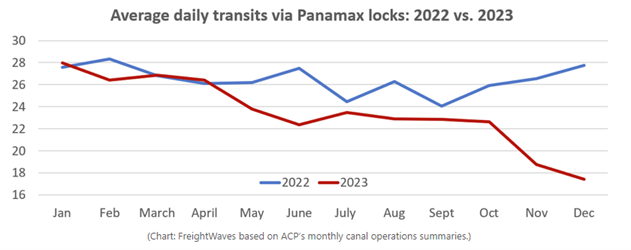
Source: FreightWaves
Port News
- Long Beach is seeing berthing delays as vessels bunch up due to late arrivals.
- Wait times in Houston have increased recently to 3 to 5 days, as the port has several cranes under repair.
Rail
One year after the massive derailment in Ohio, Norfolk Southern is the only Class I railroad to join a Federal Railroad Administration safety program. NS President and CEO Alan H. Shaw stated that the company is committed to setting the gold standard for rail safety. The goal is to foster an environment where safety concerns can be reported without workers fearing losing their jobs. It encourages employees to report any "close call" incidents to keep safety at the forefront.
Customs
Some highlights from CBP’s December 2023 monthly update include:
-
- CBP continues to lead in eliminating goods made with forced labor from the supply chain. In December, CBP stopped 450 shipments valued at more than $187 million.
- CBP seized 1291 shipments that contained counterfeit goods valued at more than $86 million.
- Ocean imports were up in December, accounting for 41% of the total import value; CBP processed more than 2.6 million entry summaries valued at more than $260 billion, with estimated duties being nearly $6.3 million.
- CBP is modifying the timing of the automatic release message for non-express air cargo effective January 27 to give CBP sufficient time to review entries and notify the filer of holds.
- FMC has ruled that starting February 1, Common Carriers and Conferences must provide public access to their tariff publication systems free of charge.
The international team is here to help with your logistic needs! Making Logistics Happen! international@il2000.com
Sources: Wall Street Journal, Drewry Shipping Consultants, Distribution Publications, Maersk, Freight Waves, Maersk, CBP.gov, customsandinternationaltradelaw.com

Published 1/4/2024
INTERNATIONAL MONTHLY MARKET UPDATE
January 2024
As we head into the new year, the looming drought and delays at the Panama Canal bring uncertainty for shippers. Now, there is also the threat to vessels traveling through the Suez Canal, which has had carriers scrambling for solutions for the last 20-plus days.
Just over the holiday weekend, another Maersk vessel was attacked. The Maersk Hangzhou had a double attack as the US sent two destroyers in to assist. Maersk then issued a statement to pause all transits through the Red Sea / Gulf of Aden until further notice. Carriers have started rerouting vessels around Africa, causing delays, war risk surcharges, and vessels being held in position while they figure out their next move.
Carriers are now using the uncertainty in the Red Sea to raise freight rates. The Federal Maritime Commission has been permitting carriers to publish new tariffs with less than the usual 30-day notice. Maersk and MSC have already issued letters. CMA announced new Peak Season Surcharges that continue to increase. The Shanghai Containerized Freight Index (SCFI) showed a 162% rate increase from Shanghai to North Europe over the last two weeks.
Shippers enter 2024 uncertain of how long the Suez Canal situation will continue. This, along with the Chinese New Year almost upon us, will continue causing freight rates to increase. Capacity will be limited, blank sailings will increase, and we will see delays in the overall global transit. We suggest that all our customers review their lead times and check with the international team for the best options.
Europe
Starting January 1, 2024, the Europe Emissions Trading System (ETS) surcharge will be applied to all cargo originating from or arriving at an EU-operated port. Europe’s goal is to become the first climate-neutral continent by the end of 2050. The ETS intends to assist Europe by introducing a price for all greenhouse gases being emitted in this sector.
China
The Lunar New Year celebration is a little later this year, starting February 10 and lasting through the 17th. If something is urgent, please check with your supplier to ensure the product can be shipped prior to their closing. Many carriers implement blank sailings during this time, and pre-booking is suggested.
South China Customs offices (excluding Hong Kong, Da Chan Bay, Yantian, and Shekou) announced they will be off duty during the Chinese Lunar New Year period. Barge services will be suspended during this time as customs will be closed. Any cargo arriving during this time will be delayed for connection and incur demurrage. The planned barge suspension will be from February 5 through the 18th.
Port News
US Imports are still tracking higher than before the pandemic. However, November shows a 9% fall, with the East Coast and Gulf Ports getting hit the hardest. Conditions worsening at the Panama Canal combined with seasonality are causing the decline.
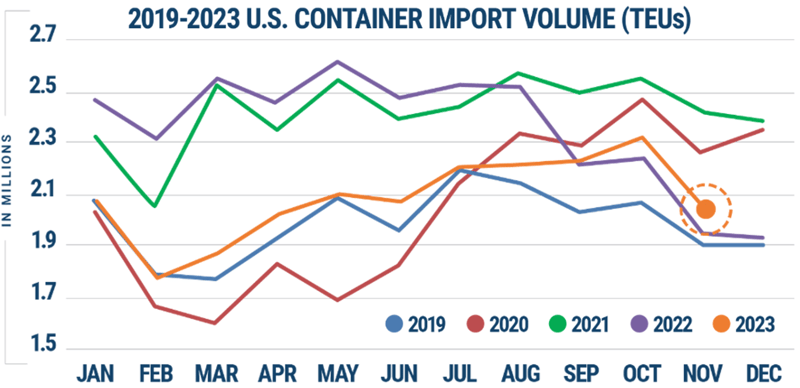
Chart: Descartes. Data: Descartes Datamyne. Source: FreightWaves
Customs
On January 2, the US Census Bureau sent out a notification with updated Schedule B and Harmonized Tariff Schedules codes that will not be valid in 2024. They will give a 30-day grace period for the outdated codes. Please see the links below for more information:
- The 2024 Schedule B and HTS tables are available for download at: http://www.census.gov/foreign-trade/aes/documentlibrary/#concordance
- The current list of HTS codes that are not valid for AES is available at: https://www.census.gov/foreign-trade/aes/documentlibrary/concordance/hts-not-for-aes.txt
On December 24, the US Departments of Commerce, Treasury, Justice, State and Homeland Security Issued a Joint Quint-Seal Compliance Note; "Know Your Cargo: Reinforcing Best Practices to Ensure the Safe and Compliant Transport of Good in Maritime and Other Forms of Transportation." This document highlighted the responsibility of individuals' and entities' participation in global trade to assess their risk and implement compliance programs. This note included potential indicators that could be an effort to evade sanction and export controls and recommended compliance practices that should be followed.
The Customs Broker Triennial Status Report opened on December 18, 2023, and is due by February 29, 2024.
CBP's November 2023 monthly update was published on December 22, 2023. Some of the highlights include:
- Over 2.7 million entry summaries were processed and valued at more than $268 billion, with an estimated duties of $6 billion to be collected. Ocean entries accounted for 38%.
- CBP seized 1607 shipments containing counterfeit goods valued at more than $118 million.
- The defense of the US agricultural system is huge, and CBP issued 363 emergency action notifications restricting and prohibiting plant and animal products from entering the US.
The last meeting of 2023 for the Commercial Customs Operations Advisory Committee was held on December 20, 2023. It unanimously passed 12 recommendations on export modernization, rapid response, and North American trade. These recommendations aim to improve US CBP’s operation and communication while empowering businesses to remain compliant with trade laws and policies.
The international team is here to help with your logistic needs! Making Logistics Happen! international@il2000.com
Sources: HMM, Maersk, FreightWaves, American Shipper, CBP.gov, Customsandinternationaltradelaw.com, The Telegraph UK, MSC, CMA, US Census









